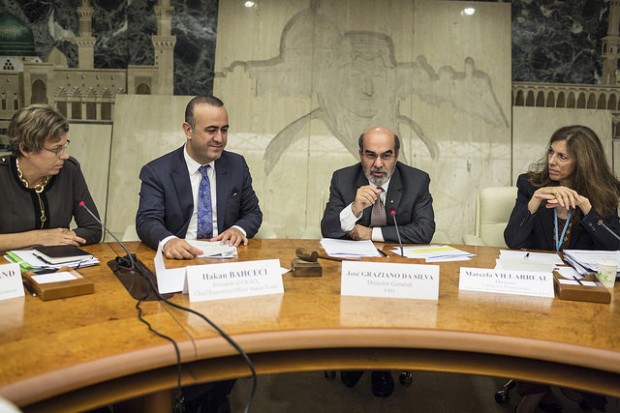World Milk Day 2024 Report – Celebrating Dairy’s Vital Role in Nutrition and Sustainability
This year, on June 1, we celebrated the vital role that dairy plays in delivering…

FAO Director-General José Graziano da Silva, urged private sector representatives to contribute to the creation of conditions that ensure responsible investments in food production and agriculture.
“Investment is a private decision. It’s your decision. You are the only ones responsible for investments, which however need an enabling environment,” the FAO Director-General said speaking to members of the Private Sector Mechanism partnership attending the Committee on World Food Security (CFS) in Rome.
“Help these principles become part of the environment considered necessary for investment,” Graziano da Silva said, referring to the Principles for Responsible Investment in Agriculture and Food Systems (RAI) that were endorsed by the CFS yesterday.
The meeting with the Private Sector Mechanism (PSM) was the third of a series of high level meetings with private sector representatives that started in 2012. The main topics discussed centred on ways to improve the business model for small-holder farmers, and on food losses and waste.
“We need more governance and the private sector cannot be left out,” Graziano da Silva said, noting how the private sector can help FAO’s work in achieving a world free of hunger and also assist in obtaining the necessary political support to do this.
“Help us implement consensus achieved in the Voluntary Guidelines on the Responsible Governance of Tenure,” he asked the PSM representatives
FAO’s enhanced cooperation with the private sector
Hakan Bahceci, Chairperson of the Private Sector Mechanism (PSM) at the CFS, said he appreciated FAO’s enhanced cooperation with the private sector since the FAO Director-General took office in 2012.
“The private sector wants to be considered not only as a donor but as a partner. Business and associations are eager to work with you,” he said.
Bahceci highlighted how this year’s private sector delegation to the CFS is “bigger than ever” including more than 90 delegates who represent stakeholders ranging from farmers to manufacturers – something that “reflects the positive development in our relationship,” the PSM Chairman said.
Bahceci thanked the FAO Director General for the new Private Sector Workstation inaugurated at FAO headquarters yesterday. “It is helpful for our team and a symbol of your commitment in our long-term work”.
The International Fertilizers Association (IFA) supports the International Year of Soils
Charlotte Hebebrand, Director General of the International Fertilizers Association (IFA) announced financial support to FAO for the 2015 International Year of Soils.
“We congratulate the United Nations for this initiative and reiterate the importance of soils for food security,” she said. “Soils need more care and attention. They are crucial to meet the challenge of feeding a growing population,” Hebebrand added.
Bringing nutrition back to the global agenda
The FAO Director–General, addressing the private sector representatives, also stressed the need for “healthy food to achieve healthy diets that result in healthier lives” and highlighted the role the private sector played in the finalization of the outcome documents for the Second International Conference on Nutrition (ICN2) – the Rome Declaration on Nutrition and the Framework for Action.
“We need ICN2 to be a reference point. There will be criticism, but let’s build consensus and a position that can be accepted by everybody,” Graziano da Silva said. “We need your presence, you know how to do it,” he told the private sector representatives.
“Raising the levels of nutrition is part of FAO’s constitution, it is written in marble in our headquarters,” the FAO Director-General said. “We have focused on improving food production and neglected nutrition,” he added, noting that as a result “we have more than enough food but we still have alarming levels of malnutrition and obesity, diabetes and other non-communicable diseases.”
Jointly organized by FAO and the World Health Organisation (WHO) in Rome from to 19-21 November, ICN2 is as a high-level intergovernmental meeting which aims to achieve a global political commitment on improving nutrition.
Heads of state and government, other dignitaries and leaders are expected to attend. Pope Francis and Queen Letizia of Spain have already confirmed their participation.
More than 70 private sector delegates are already registered to participate in the conference. “We want to send a strong signal about the importance of nutrition and the role we can play,” Bahceci said.
Pre-conference events will be organized by stakeholders: one for civil society organizations; another for private sector representatives; and a third event for parliamentarians.
These events will be held outside FAO premises and will provide an opportunity for stakeholders to coordinate their participation in ICN2 and to agree on a statement to be delivered during the conference.
The private sector event will be held in Rome on 18 November.